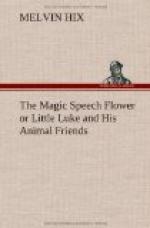There was Sam, the hired man, who thought he knew a good deal about the wild folk. And there was Old Bill, the hunter, who had done little besides hunting and trapping all his long life; even these did not begin to know the beasts and birds as little Luke knew them. Before the Finding of the Magic Flower, he had thought them marvels of woodcraft and fieldcraft. Now they seemed to him almost blind and deaf.
As he went about with them, he found that for all their boasting (and they often boasted) they really knew little about the wild folk. Many times they would pass Wa-poose the Rabbit sitting unseen on his form within a few feet of them. Mother Mit-chee the Ruffled Partridge made her nest in plain sight on the ground beside the old trail and they passed by a hundred times and never saw her. And so it was with many others of the wild folk. Often they went quietly about their business before the very eyes of the house people who did not see them.
During that summer little Luke spent much time with Old John the lone Indian, who lived at the foot of Black Mountain. For Old John, seeing the little boy’s love of woodcraft and his wonderful keenness of ear and eye, and understanding, came to love him more than he had loved anyone or anything for many years.
He would make some excuse to come to the farmhouse. Then, when his pretended business was finished, he would sit with the little boy on an old bench on the lawn and tell him stories of the Red Men or of the wild folk.
Sometimes, too, the little boy would go up the trail and sit by the spring where he had found the Magic Speech Flower and wait for the old Indian. Or, when Old John started for home, he would go along with him up into the woods and there they would sit on a fallen log and talk of the old days when the Red Men dwelt in that land, or of the wood folk they saw and heard about them. These were most enchanting tales, and little Luke enjoyed them exceedingly.
And he learned that in some matters Old John was very wise. But these were mostly concerned with hunting and trapping. Little Luke did not like the idea of killing any of his wild friends, even though he knew that their flesh and fur were very useful. He knew, too, that the Law of the Wild Kindred allowed everyone to kill to supply his need and so he did not much mind the killing in Old John’s stories, for he knew that the old man never killed any creature needlessly.
And he learned, too, that the old Indian had some strange notions about the wild folk. He believed that long ago they had all been very much like men. “In those days,” he said, “the animals could talk and build wigwams just as the Red Men did.” He believed, too, that the forefathers of some tribes of the Red Men had been animals, and that the forefathers of some of the animal kindreds had been men. All this seemed queer to the boy, but not half so queer as it would have seemed before the Finding of the Magic Speech Flower and his talks with the wild folk.




